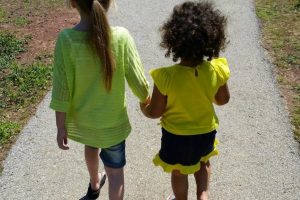Written by: Michelle Topal, MSW, LCSW – LGBT Therapist & Licensed Clinical Social Worker
Separation and divorce can be a difficult, painful process for everyone involved. It represents significant change and loss, and triggers in most people, deep feelings of failure, lack of control, rejection and abandonment, and can cause anxiety and depression in children. Many books have been written about the impact on children of these types of family system change. This article, will summarize just a few of these.
Here are just a few things children experience when parents decide to separate/divorce:
1) Loss:
– Of family unity;
– The familiar on many levels;
– Of innocence and a sense of security in the world as it may suddenly seem very unpredictable and unstable;
– Of a parent as they may not experience both parents as much as they preciously had. Even if they are living equally with both parents, they are no longer living with both parents 100% of the time as they had been. Also, sometimes the non-custodial parent may withdraw or disappear significantly or totally from the parental role at times of separation or divorce. This can cause depression in children, as well as anxiety and behavioral change.
 2) Significant Changes:
2) Significant Changes:
– Who they see on a daily basis,
– Access to both parents and the care they receive from both;
– Where they live; their room and access to their things as they live in two different places; possible changes in school, economics and day to day living.
3) Lack of Control:
-Children are dependent on the adults in their lives and around them. They have little control over the events and resources in their lives. When families are changing or in transition, this can cause fear, anxiety, and depression in children as they grapple with the painful aspects of dramatic change, the unknown and unpredictable and inability to have any say or control over these.
4) Complex, Conflicted Feelings They may be Ill-Equipped to Handle:
– Relief. This is especially true if there has been a lot of conflict, tension, violence or abuse towards the children from one of the parents who the child is no longer going to be living with primarily or if this has occurred or between the parents.
– Need to take sides. If parents are openly hostile or even less openly (because kids hear and know more than you think) or are at war with each other, children may feel compelled to take sides. This is very damaging to children (more on this in future articles).
– Anger, but may feel shame or guilt about this. Again, these are complex feelings that children can struggle to navigate. Depending on age/development, what and how they were told about the changes occurring in the family, what they understand about the situation (which is not necessarily the same as what they were told), what else is occurring/the context, how the parents and rest of the family are coping and handling, and many other factors, children may be angry at one or both parents and the many aspects of often unwanted changes. They may also struggle with loving their parents and not wanting to alienate them at a time when they feel uncertain about the stability and security of the relationship. So, being angry with them may not feel safe. This and for many other reasons, this anger may come out in the child’s behavior.
– Fear of and anxiety about, greater loss, abandonment, and rejection. Sometimes these fears are realized as non-custodial parents may withdraw in part or totally from their children’s lives.
– With all of this, it is not unusual to see depression in children.
All of this may lead to emotional and behavioral change in children, such as regression in previously mastered skills and behaviors, acting out, depression or even “stepping in” to become a parental surrogate if they feel their parent or parents are struggling and not looking like they may not be able to meet the child’s or family’s needs.
Because it is likely to see depression in children, and because they may not want to hurt their parents, may not feel safe sharing openly, and/or may not yet have the developmental skills to express themselves effectively, it is often helpful to have children see a psychotherapist or counselor to give them a safe, non-partisan person to address the distress they might be experiencing. It’s important to normalize this, so the child doesn’t feel like they did something wrong or their is something wrong, sick or flawed about them. it is simply that changes can be difficult and you want them to have a safe, neutral person to share their feelings, including being able to openly share if they are upset with you and their other parent about how they are being impacted by the changes. You want for them to feel some sense of empowerment, by saying that while they can’t change what is happening in the family, and it is certainly not their fault, you want them to do what they can do about it; which is to get help to get through it and be okay.
Recognizing your child’s emotional needs and attending to these by assuring they have avenues to appropriately express and address their feelings, goes a long way to reducing the traumatic impact of separation and divorce.
Michelle Topal, MSW, LCSW is a child and family therapist that has been offering child therapy, parenting support, & family counseling, as well as helping kids, couples and families through the challenges of divorce for over 25 years.
Parenting During Separation & Divorce: The Impact on Children






Leave a Reply
Your email is safe with us.